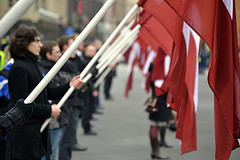About
The aim of this survey is to investigate how elections—the primary occasion in democracies for the allocation of social interests and political mobilization—affect people’s political identity and consciousness, especially with regard to national identity and policy preferences.
The focus is on the democratic multinational state Latvia; Latvia’s experience has important implications for the development of political science and global politics, as it succeeds in avoiding severe conflict in spite of unstable party system and political competition, and despite historically deeply-rooted questions around nationalism.
The same questions will be asked for several months before and after the general elections in October 2014. Through this, we are able to monitor the inter-temporal fluctuation of political identities and the cross-sectional variances in the electoral season. In addition, this survey also includes some one-shot special questions that will provide new insights for Latvia area specialists.
Who&How
PI: Ryo NAKAI, Dr. (Assistant Professor, Rikkyo University)
Polltaker: SKDS (Public Opinion Research Center, Latvia)
Method: Face-to-face PAPI / Stratified random sampling [administrative territories]
Coverage: All Latvia's regions
Support: Grants-in-Aids #25780100, Japan Society for the Promotion of Sicence
Summary
| Aggregated Results | Questionnaires* | |
| 1st wave (Jul.) | English Latvian Japanese | LV RU (EN trs.) |
| 2nd wave (Aug.) | English Latvian Japanese | LV RU (EN trs.) |
| 3rd wave (Sep.) | English Latvian Japanese | LV RU (EN trs.) |
| 4th wave (Oct.) | English Latvian Japanese | LV RU (EN trs.) |
| 5th wave (Nov.) | English Latvian Japanese | LV RU (EN trs.) |
| All waves | English Latvian Japanese | - |
